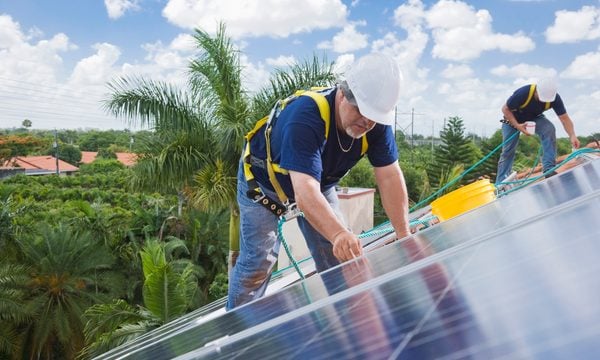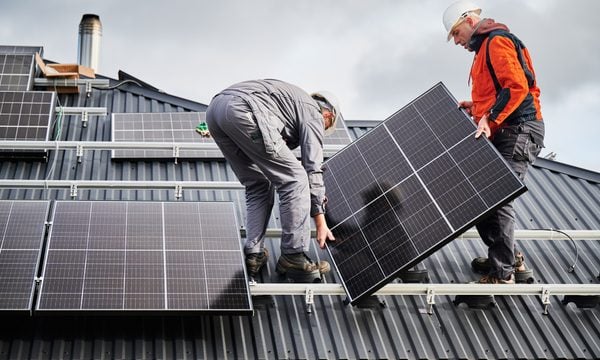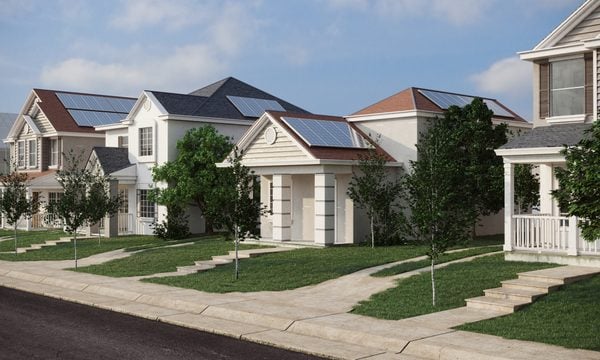Solar Panels in Florida: Costs and Incentives
Installing solar panels in Florida cost slightly more than the national average.
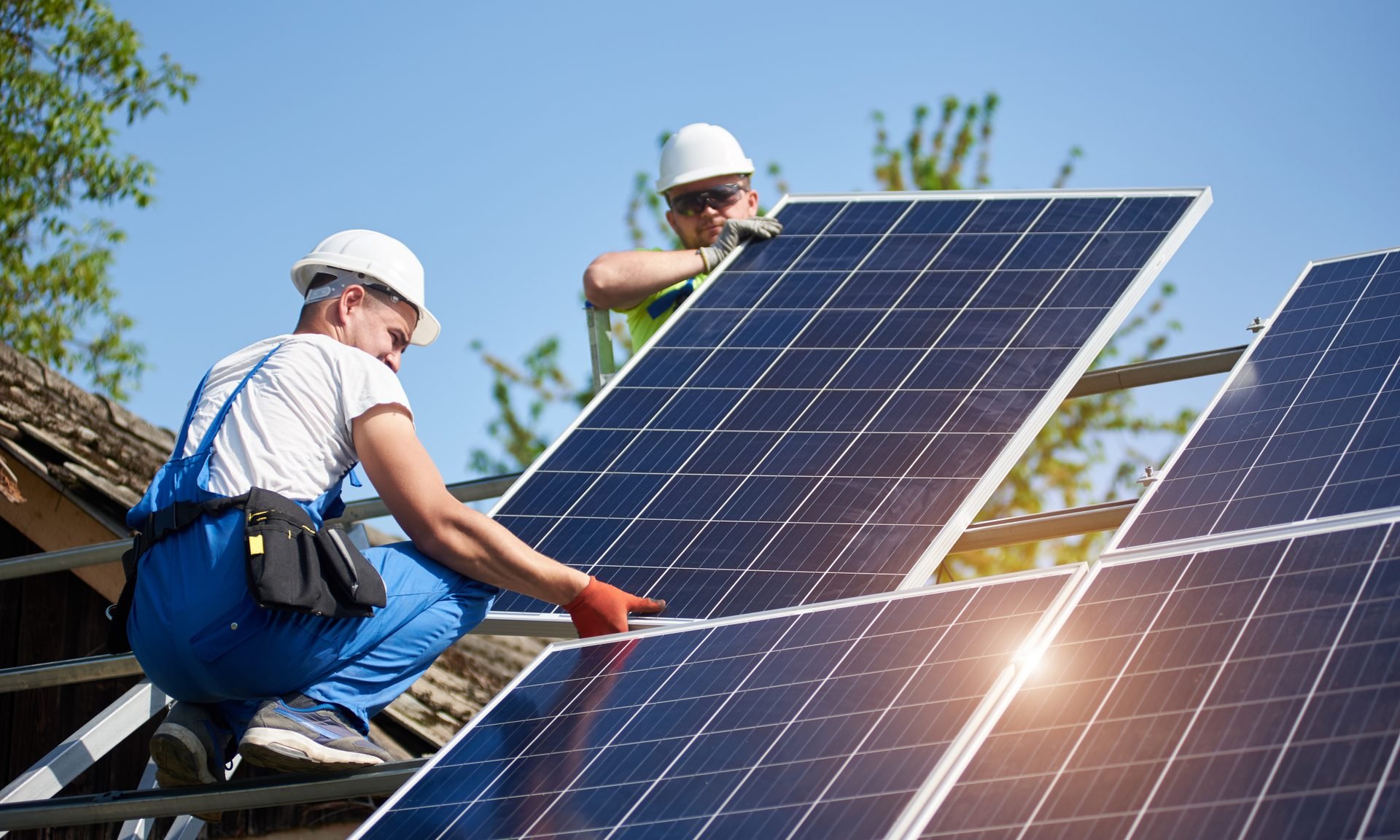
Some or all of the mortgage lenders featured on our site are advertising partners of NerdWallet, but this does not influence our evaluations, lender star ratings or the order in which lenders are listed on the page. Our opinions are our own. Here is a list of our partners.
The average cost of residential solar panels in Florida, before the federal solar tax credit, is $32,887, according to EnergySage, a solar marketplace . This is higher than the national average of $29,360.
Florida’s primarily humid subtropical climate requires a lot of energy for air conditioning. Installing larger systems makes sense in a state that has one-to-one net metering, which allows customers to offset more of their energy bills with solar. The state's net metering policies and abundant year-round sunshine have fueled strong adoption of residential solar.
Solar costs in Florida at a glance
| Florida | U.S. | |
|---|---|---|
| Typical cost of home solar system before federal solar tax credit | $32,887. | $29,360 |
| Typical cost of home solar system after federal solar tax credit | $20,997. | $20,552. |
| Median cost per watt | $2.11. | $2.56. |
| Source: EnergySage, a solar and home energy product comparison marketplace. Data is from March 27, 2025. | ||
The average residential solar energy system in Florida costs $32,887 before incentives, which is more than $3,500 over the average cost at the national level, according to EnergySage. Florida homeowners also pay $2.11 per watt, much lower than the national average of $2.56 per watt.
The average Florida home with solar panels replaces all of its electricity that it previously pulled from the grid, with a little leftover. Because this is an average, some homeowners will produce less energy and still need to purchase energy from the grid. On average, it takes around eight years for Florida homeowners to break even on the cost of installing their solar energy systems.
» MORE: What do solar panels cost?
Net metering in Florida
Florida adopted net metering in 2008, which allows homeowners to sell excess electricity to the local utility . Homeowners who produce more solar energy than they use are credited for the excess energy on their next month’s bill. If they continue to produce more each month than they use, their credits are saved through December of the given year and the utility company pays homeowners for leftover credits after the homeowners pay their December power bills.
Solar property tax exemption in Florida
Florida does not include the value of solar energy systems when calculating residential property taxes for homeowners . This means the annual calculation of your property tax won’t increase because of solar equipment you install on your property; however, it can go up because of other factors.
Sales tax exemption for solar systems in Florida
Florida doesn’t charge sales tax on equipment for residential solar energy systems .
Solar loan programs in Florida
Some cities offer solar loan programs. For instance, the City of Tallahassee Utilities offers a 10-year secured loan with 5% interest for solar panel installations, with a maximum loan amount of $20,000 .
Solar equipment rebates in Florida
Some cities offer rebates for certain types of solar equipment. The City of Boynton Beach, for example, gives residents up to $1,500 for qualifying solar energy systems . Additionally, providers like the Fort Pierce Utilities Authority also offer flat rebates on solar water heaters. If you intend to include a solar water heater in addition to a solar panel system, check for this type of incentive in your area.
» MORE: How solar leasing works
Solar batteries in Florida
The average cost of a 10kWh solar battery in Florida was $13,000 before the federal tax credit in January 2025. However, with net metering available for most residents, a battery backup will likely be more helpful during a power outage rather than to store energy to avoid using the power grid.
Can I get financing for a solar panel system?
In addition to tax incentives and rebates, there are options available. Many solar installers offer financing, but you may also be able to finance your solar investment through a home equity loan or home equity line of credit (HELOC). These options may have lower interest rates than financing with an installer, future opportunities for refinancing and possible tax benefits.
Home equity loans and HELOCs are ways to borrow against the value of your home, converting equity into cash. With a home equity loan, you receive a lump-sum payment and then pay it back at a fixed interest rate over an agreed period of time, typically from five to 30 years. HELOCs are more akin to a credit card, something you use as needed. You’ll usually have 10 years to draw from the line of credit, during which time you only have to pay interest, and after that you pay both the principal and interest. HELOC interest rates typically are variable, meaning your monthly payment could rise or fall over time. And with each of these options, you're using your home as collateral.
Advertisement
Min. credit score 600 | Min. credit score 600 |
Min. down payment N/A | Min. down payment N/A |
Another option is a solar loan. Many banks, credit unions and online lenders offer these to fund solar panels and installation, with amounts typically from $1,000 to $100,000, and annual percentage rates ranging from 6% to 36%. They function like a personal loan: you receive a lump sum and repay it in equal monthly installments over a set period, typically two to seven years. And unlike with home equity financing, there is no collateral required for a solar loan. This means your home or solar panels aren’t at risk if you miss payments, but you may have to pay late fees.
So, yes, you likely can get financing. If you go this route, compare interest rates, terms and fees with any financing package that a solar provider may offer you to ensure you get the best deal.
Frequently Asked Questions
What is the average cost to install solar panels in Florida?
The average cost to install a solar energy system in Florida is $32,887 before incentives. This drops to $20,997 after incentives.
How long do solar panels take to pay for themselves in Florida?
On average it takes eight years for solar panels to pay for themselves in Florida, but this can vary for individual homeowners.
Article sources
NerdWallet writers are subject matter authorities who use primary,
trustworthy sources to inform their work, including peer-reviewed
studies, government websites, academic research and interviews with
industry experts. All content is fact-checked for accuracy, timeliness
and relevance. You can learn more about NerdWallet's high
standards for journalism by reading our
editorial guidelines.
- 1. EnergySage. Solar Panel Cost in 2024. Accessed Jan 15, 2025.
- 2. Florida Administrative Register. Rule 25-6.065: Interconnection and Metering of Customer-Owned Renewable Generation. Accessed Jan 21, 2025.
- 3. Florida Legislature. Title XIV , Chapter 193: Assessments. Accessed Jan 21, 2025.
- 4. Florida Legislature. Title XIV, Chapter 212: Tax on Sales, Use and Other Transactions. Accessed Jan 21, 2025.
- 5. City of Tallahassee. Energy-Efficiency Loans - Residential Customers. Accessed Jan 21, 2025.
- 6. City of Boynton Beach. Energy Edge Rebate Program. Accessed Jan 21, 2025.
More like this
Related articles
AD
Save On Solar Without the Middleman
Free Instant Quote
on Project Solar's website

AD

Save On Solar Without the Middleman
- $750 OFF install with NerdWallet;
- SolarCare™: top-tier warranty & 25-year production guarantee;
- No sales commissions mean premium equipment & tech at up to half the price.
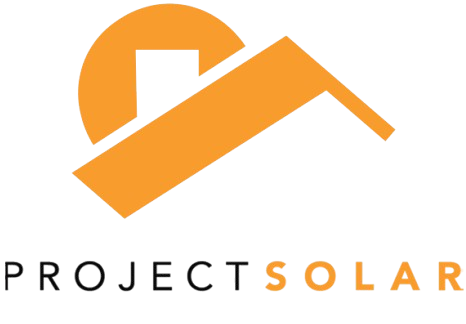
Free Instant Quote
on Project Solar's website









